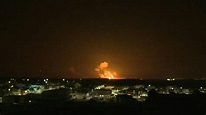Featured
article
- Get link
- X
- Other Apps
Russia Calls for Israeli Restraint Amid Escalating Tensions with Iran
Russia has urged Israel to exercise restraint in its ongoing conflict with Iran, emphasizing Tehran's right to self-defense. Deputy Foreign Minister Sergei Ryabkov stated that Israel must show "restraint and common sense" as the crisis unfolds.
The confrontation escalated after Israel launched strikes against Iran's nuclear sites and military leadership last Friday, prompting Iran to retaliate with missile attacks on Israeli cities. Russia, which has a strategic partnership with Iran, expressed concerns over the potential consequences of strikes on nuclear infrastructure and their impact on global markets.
The Kremlin also highlighted its willingness to mediate between the two nations, offering to remove highly enriched uranium from Iran and convert it into civilian reactor fuel as a possible solution to defuse tensions over Tehran's nuclear program.
Russian President Vladimir Putin and Turkish President Tayyip Erdogan discussed the situation in a phone call, agreeing that the conflict poses significant risks to regional stability and calling for an immediate cessation of hostilities.
As diplomatic efforts continue, the international community watches closely, hoping for a resolution that prevents further escalation in the Middle East.
Popular Posts
Midnight Blast Shakes Gaza Skyline Amid Rising Tensions
- Get link
- X
- Other Apps
Trump's Six Words: "I'm Going to Stop the Wars"
- Get link
- X
- Other Apps




Comments
Post a Comment